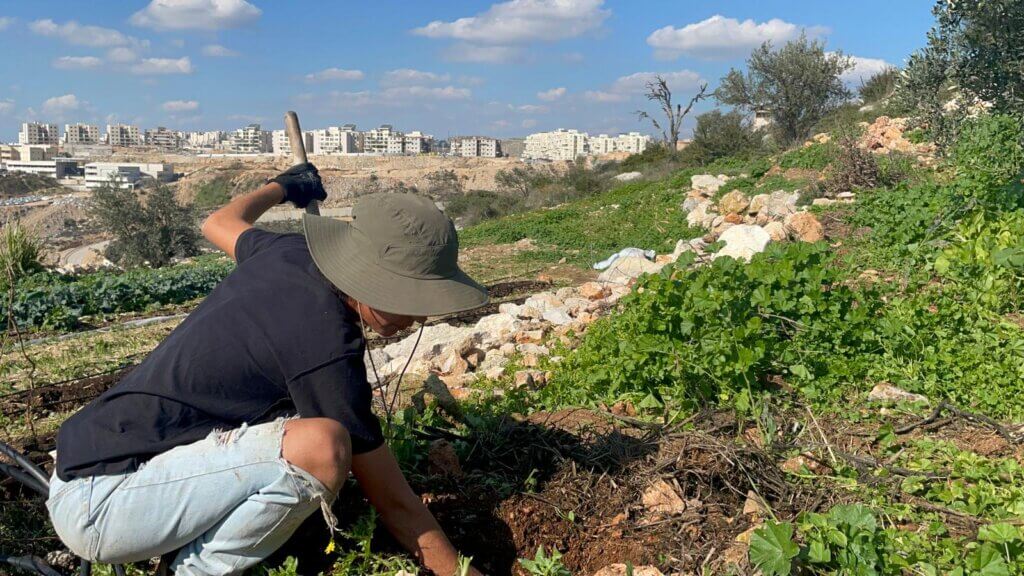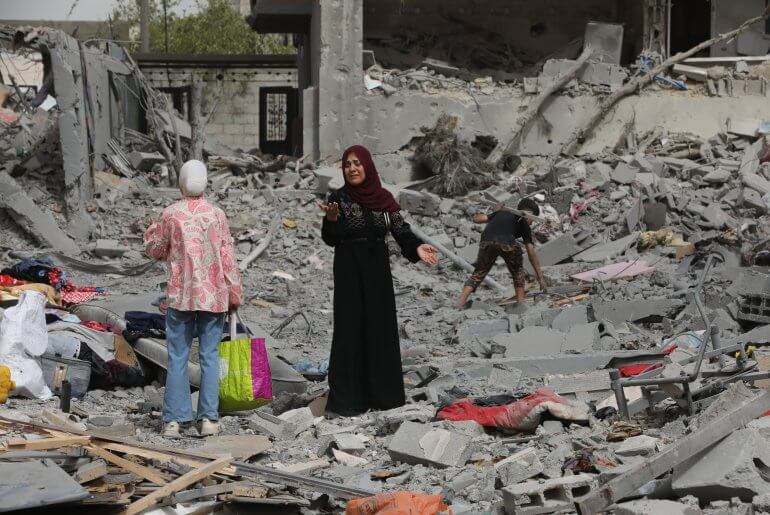As apartheid Israel’s brutal siege of Gaza enters its 15th year this June, food sovereignty and climate activists Mohammed AbuJayyab and Asmaa Abu Mezied emphasized the centrality of the agricultural space in building resistance, autonomy and community in the greater fight for justice and Palestinian liberation in a recent public conversation hosted by Adalah Justice Project (AJP) and American Friends Service Committee (AFSC).
“To talk about agriculture in Gaza particularly, the first thing that comes to mind is the systematic challenges that face farmers in Gaza,” related to climate change and daily worries of production, yield and market prices, says Abu Mezeid, an economic development and social inclusion specialist .“Diving deep into them, you will understand how political and politicized these challenges are.”
Organizing around climate justice, agriculture, and self-sufficiency is often depoliticized and, in Gaza in particular, is poorly understood and relegated to the humanitarian food security scene. And whereas discussions of food security have largely turned to a mathematical science focusing purely on numbers – such as how many calories people have access to, nutrient content of available food, etc. – food sovereignty offers a more holistic and transformational approach.
AbuJayyab, a Palestinian fellah, farmer, and food sovereignty activist, describes food sovereignty as a process of “self discovery” that goes beyond the bare-bones framework of food security. “Food sovereignty is really about the choice in the production and consumption cycle of food, of foods that happen to be relevant ecologically, culturally and economically,” continued AbuJayyab.
Currently in Gaza, cash crops such as strawberries and flowers are king due to a necessity for income within a convoluted trade system subject to change at Israel’s whims, as well as a lack of available land for more sustainable food crops. This dependency on cash crops, however, has resulted in an increased reliance on importing food products used in daily life – imports which are also subject to fluctuations from Israel.
How radically different were crops in pre-1948 Palestine when compared to Palestine today? “Just a single field crop (wheat) was five times bigger than the amount of land that is available for people in Gaza Strip,” says AbuJayyab.
Israel also suppresses the work of cooperatives, critical spaces for food sovereignty and Palestinian liberation, through barriers imposed on the trading and selling of goods outside of Gaza. Abu Mezeid shared the example of the tomato. “Lots of agricultural farmers plant tomatoes to be traded with the West Bank or other places. Now the Israelis put restrictions on the selling of tomatoes that you have to remove the (stem). That reduces the shelf life of the tomato by half. And if you have those tomatoes staying at the crossing for a couple of days, then you will have huge losses.”
The extent of crop destruction and degradation carried out under Israel’s Zionist project is only further exacerbated by the effects of the ongoing siege of Gaza, which has been deemed illegal under international law. “The Gaza Strip is a very small geographic area. The total area of the Gaza Strip is 140 square miles, equivalent to the total area of metropolitan Detroit. But imagine metropolitan Detroit as an area that is isolated from its surroundings so there is no access to further land beyond the confines of this blockaded (area),” stated Jehad Abusalim, Education and Policy Associate at the American Friends Service Committee.
AbuJayyab also points out the extremely unequal population distribution within the area, particularly in refugee camps. Access to parcels of land and resources between refugee camp areas and the rest or between the north and south of Gaza can vary widely, fostering discord – an intentional outcome of the Israeli occupation. NGOs working on food security and agriculture in Gaza frequently intensify this social stratification by focusing on more arable and developed areas in the north that are easier to make sustainable, therefore widening the gap.
Abu Mezeid and AbuJayyab both also point out the complicity of aid organizations in maintaining the status quo through their unwillingness to recognize the political roots of the ongoing economic, humanitarian and ecological crisis in Gaza and Palestine more broadly.
Agriculture as resistance
The decimation of agriculture in Gaza also functions as a tool of the occupation to separate and weaken Palestinians and the liberation cause – economically, mentally and physically. This has resulted in a fundamental shift in Palestinians’ relationship to the land and agriculture.
“Over the past few decades, there has been a huge gap in the detachment that Palestinians in Gaza have to the land. And it’s very natural if you look at what kind of systematic processes the occupation has put in place to ensure that this detachment and this gap is widening every single day,” said Abu Mezeid. “In the past, agriculture has been part of identity, it was not an act of income generation by itself. It was an act of building social cohesion. It was an act of coming together and also having a national identity. But now agriculture has been reduced to only a labor you can do to have an income and even the occupation has systematically made that income coming from agriculture not sustainable. And that is why we are seeing a lot of young people leaving agriculture.”

“The Palestinian fellahin and the land are the foundations of our society. As one of today’s guest speakers, Mohammed Abu Jayyab explains, a fellah is more than a farmer. The Arabic root of ‘fellah’ means the act of becoming. Every season, we come back again to be who we are. The Palestinian connection to the land is essential, in fact, it is our essence. Zionists knew this,” said Sandra Tamari, Executive Director of Adalah Justice Project. “The environmental devastation that the Zionist endeavor is reigning down on Palestinians is not a footnote in the colonial project, but rather an key feature.”
“If we look at our older generation like my grandparents, for them to sell land to live was not even a question. It was a red line that nobody would even think about. But now, the political and economic collapse in Gaza is pushing people to the point that they would sell a piece of land because they have nothing to eat,” continued Abu Mezeid. “And that puts a lot of people into a trap of guilt. To what extent am I having to make a choice between survival and between feeling I have failed my identify, my Palestinian national participation?”
Abu Mezeid also points to the decimation of green spaces in Gaza as part of Israel’s strategy to separate Palestinians and prevent community organization. “We are no longer seeing the green areas we used to see, we are no longer seeing the trees that used to decorate the streets that had so many memories, that were also spaces for Palestinians to hide when they were fighting against the occupation and are a symbol of their existence to the land.”
The future of agriculture in Gaza
“The picture is very bleak,” said Abu Mezeid when discussing the state of sustainable agriculture in Gaza in 30 years time.
The effects of climate change in Gaza including extreme heat waves, droughts and high water salinity offer a peek into an apocalyptic future for the 140 square mile area home to more than two million Palestinians if no immediate action is taken.
“It’s important to understand how climate change is affecting Palestinians in Gaza. What we are seeing is diverse impacts when it comes to climate change,” ranging from increased skin diseases to high rates of food spoilage to a lack of viability of crops the population depends on to live, said Abu Mezeid. All of these effects are exacerbated by a collapsed health system within Gaza, and no opportunity to seek care or resources elsewhere due to the Israeli blockade.
Despite the glaring devastating human and ecological effects of Israel’s occupation of Palestine and illegal blockade on Gaza in particular, leading conservation organizations such as the 120-year old Sierra Club have remained complicit in the greenwashing of Israel’s Apartheid regime.
In March, Sierra Club backtracked on its commitment to a coalition of Palestinian, Indigenous, Black and Jewish organizations to end its nature outings to Apartheid Israel after being pressured by the Simon Wiesenthal Center, the Anti-Defamation League and the Jewish Community Relations Council. Sierra Club’s Interim ED Dan Chu’s statement, like the trip descriptions, does not mention Palestine or Israel’s brutal occupation of the Palestinian people.
And while there is a significant influx of aid money to Gaza, both Abu Mezeid and AbuJayyab highlight the critical need for international organizations to recognize the innate political nature of agricultural work in Gaza and Palestine. “We really need to bring to the conversation how any agricultural intervention cannot be addressed in a depoliticized way, and any developmental efforts need to talk about food sovereignty rather than food security,” said Abu Mezeid.
However, there is still hope.
While the shameful decision from the Sierra Club exacerbates already dire ecological conditions facing Palestinians in the coming years, it also dismisses the growing support in the U.S. for Palestinian liberation and justice.
A recently released national poll from AFSC found that the majority of Americans oppose Israel’s blockade on Gaza. These findings come after Amnesty International’s February 2022 report finding Israel guilty of the crime of apartheid against Palestinians, reaffirming Palestinian activists’ long calls for awareness and accountability and echoing the findings of previous reports from human rights groups B’Tselem and Human Rights Watch. “The global movement and solidarity for farmers is a great example that we can learn from and build upon,” said Abu Mezeid. “As Palestinians across Gaza, the West Bank and East Jerusalem, we need to do our homework of connecting these initiatives together in a holistic way so we present different aspects of Palestinian narrative when it comes to agriculture.”
Additionally, NGOs cannot take the place of local cooperatives or indigenous resistance. “The fight for Palestine started as a fight for the commons. We need to go back not only to the techniques but the values. But we need the resources to actually get there,” said AbuJayyab. “We are under-resourced. We need a ton of help to put more effort into the (cooperative) sector and education and work.”
“The intersection between these topics in Gaza Strip as a current experiment is probably one of the most important liberation experiments that we have in our Palestinian history,” continued AbuJayyab. “Usually we look at it as there is this resistance phase that we go through, then this sovereignty phase of building a national character or view of self. But in these long running struggles, we can’t afford to relegate it to a later stage. We can’t do that, Indigenous folks here in the U.S. cannot do that, Black Americans cannot do that. So we end up having to entangle our struggles, our resistance.”
How to Get Involved
- Write your members of Congress and demand an end to Israel’s cruel and illegal blockade of Gaza on the AFSC website or at GazaisPalestine.com.
- Follow and support Om Sleiman Farm on Facebook and Instagram at @omsleimanfarm
- Subscribe to our listserv to stay updated on upcoming events, campaigns and ways you can get involved in the cause: adalahjusticeproject.org/join-us
This event was a part of AJP’s Gaza is Palestine campaign
and AFSC’s Gaza Unlocked campaign.
Panelist Bios
Mohammed AbuJayyab is a Palestinian fellah, farmer, and food sovereignty activist. He is a co-founder of Om Sleiman Farm (2015) in Bil’in in the West Bank, and one of the collaborators behind Al Barakeh Wheat (2019) in Jordan. His upbringing in a refugee camp in Gaza Strip has made issues of belonging and social justice a central theme in his work. He is a co-developer of a farm-based political and educational framework.
Asmaa Abu Mezied is an economic development and social inclusion specialist working with Oxfam to address issues of gender, development, and climate change in the agriculture sector. Her research interests focus on the care economy, women’s collectives organizing in economic sectors, the private sector’s social accountability, and the intersection of Palestinian political, agricultural, and environmental identities. She was an Atlas Corps Fellow in partnership with President Obama Emerging Global Leaders, a Gaza Hub-Global Shaper (an initiative of World Economic Forum), and a 2021 Mozilla Foundation Wrangler at “Tech for Social Activism” space.
Adalah Justice Project
Adalah Justice Project is a Palestinian advocacy organization based in the U.S. that aims to shift public discourse and policy on Palestine. We work towards collective liberation. No one is free until all of us are free.
American Friends Service Committee
American Friends Service Committee is a Quaker organization devoted to service, development, and peace programs throughout the world. Our work is based on the belief in the worth of every person, and faith in the power of love to overcome violence and injustice.



